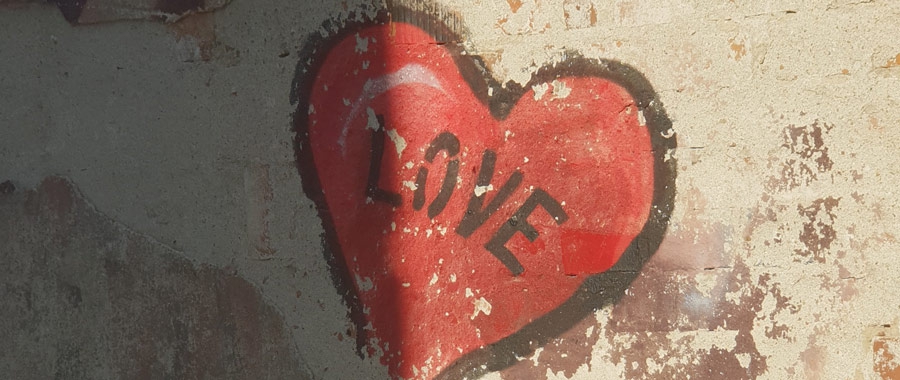The views expressed in our content reflect individual perspectives and do not represent the authoritative views of the Baha'i Faith.
“Yeah, like, I love my new jeans, know what I mean? Like they fit so good, and everyone loves them.” I heard this sentence the other day, and wondered: did it really describe feelings of like, or love, or both?
In describing the feelings in our hearts, we utilize the word like a bit less these days – unless you count all the verbal colloquialisms, hedges, discourse particles, and fillers that have somehow found their way into the English language, as in: “She was, like, ‘I’ll be there after school.’”
Instead, we seem to favor the superlative word “love” when we buy something we want, or something good happens, we see a movie that moved us, or we receive a great birthday present. “I love it!” we say in all honesty.
So has the word love descended into a mere synonym for like, robbing it of its true meaning? How do we truly distinguish between like and love?
Goethe said “We are shaped and fashioned by what we love,” but most of us should know the difference when it comes to liking or loving people versus things.
Abdu’l-Baha, in a talk he gave in London in 1913, said:
What a power is love! It is the most wonderful, the greatest of all living powers.
Love gives life to the lifeless. Love lights a flame in the heart that is cold. Love brings hope to the hopeless and gladdens the hearts of the sorrowful.
In the world of existence there is indeed no greater power than the power of love. When the heart of man is aglow with the flame of love, he is ready to sacrifice all – even his life. – Abdu’l-Baha, Paris Talks, pp. 179-180.
As we all know, “I like you,” means something vastly different than “I love you,” depending on the person we’re speaking to and how close we feel to them. If you like something or someone, you might think of them as interesting or enjoyable. If you love someone, it goes much deeper and traverses many more levels.
We all experience love, or the need for love, long before we experience liking anyone or anything. Most children form deep, loving bonds with their parents and friends from a very early age. It starts before a child can verbally express his likes or dislikes. Even newborns feel attachment to the mother from the moment they’re born. We crave warmth from a human heart, a mother, father or a close one. As we grow we may like them or not, depending on their personality or the love they shower on us or withhold from us. In sad, all-too-common cases, parents deprive us of love and simple humanity, and we suffer unless we overcome it.
So how can we possibly understand love? The Baha’i teachings say that four distinct kinds of love exist:
There are four kinds of love. The first is the love that flows from God to man; it consists of the inexhaustible graces, the Divine effulgence and heavenly illumination. Through this love the world of being receives life. Through this love man is endowed with physical existence, until, through the breath of the Holy Spirit – this same love – he receives eternal life and becomes the image of the Living God. This love is the origin of all the love in the world of creation.
The second is the love that flows from man to God. This is faith, attraction to the Divine, enkindlement, progress, entrance into the Kingdom of God, receiving the Bounties of God, illumination with the lights of the Kingdom. This love is the origin of all philanthropy; this love causes the hearts of men to reflect the rays of the Sun of Reality.
The third is the love of God towards the Self or Identity of God. This is the transfiguration of His Beauty, the reflection of Himself in the mirror of His Creation. This is the reality of love, the Ancient Love, the Eternal Love. Through one ray of this Love all other love exists.
The fourth is the love of man for man. The love which exists between the hearts of believers is prompted by the ideal of the unity of spirits. This love is attained through the knowledge of God, so that men see the Divine Love reflected in the heart. Each sees in the other the Beauty of God reflected in the soul, and finding this point of similarity, they are attracted to one another in love. This love will make all men the waves of one sea, this love will make them all the stars of one heaven and the fruits of one tree. This love will bring the realization of true accord, the foundation of real unity. – Ibid., pp. 180-181.
God’s love – the light and rays of the light in the glass of the human heart, mind, and spirit – gives us life in this world and the next. Could God’s love for His creation – “the love that flows from God to man” – be the highest form of love?
Throughout human history, those who have believed and relied on God’s love each appeared to love not only their own friends and families, but all of humanity. History books would seem to say they did so, by their altruistic words, actions and those of their faithful followers, even creating great civilizations. So we have plenty of examples of that highest form of love.
It takes a leap of faith and a few inner realizations to get there: one, that God exists; two that our Creator loves us; three that His love actually sustains us and all created life. Without it, the Baha’i teachings say, we would cease:
Love is the most great law that ruleth this mighty and heavenly cycle, the unique power that bindeth together the divers elements of this material world, the supreme magnetic force that directeth the movements of the spheres in the celestial realms. – Abdu’l-Baha, Selections from the Writings of Abdu’l-Baha, p. 27.
You May Also Like
Comments

















― Rumi, Whispers of the Beloved